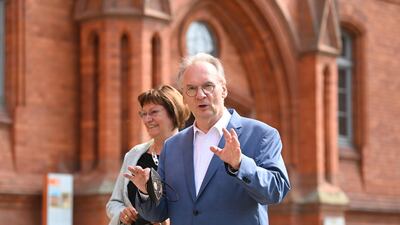Angela Merkel's CDU party scored a convincing win on Sunday in the final regional vote before the first general election in 16 years not to feature the veteran chancellor, giving a major boost to her conservative would-be successor.
The CDU under new party chief Armin Laschet won about 36 per cent of the vote in Saxony-Anhalt, first results showed, well ahead of the second-placed far-right party AfD on 22.5 per cent.
"This is essentially a sensationally good result," CDU general secretary Paul Ziemiak said.
"The CDU has won this election clearly."
Ms Merkel's party has been a dominant force in the former East German state of Saxony-Anhalt for decades, topping all but one edition of state elections there since reunification in 1990.
But there had been jitters ahead of the vote as pollsters had foreseen a neck-and-neck race between the CDU and the anti-immigration AfD.
Ralf Brinkhaus, who heads the conservatives' parliamentary group, said Sunday's clear result "gives us tailwind" for the national election.
"That is also a success for Armin Laschet."
Nominated as conservative chancellor candidate in April, Mr Laschet inherited a series of problems including anger over the government's pandemic management and a corruption scandal involving shady coronavirus mask contracts.
At Germany's last regional elections in March – in the states of Rhineland Palatinate and Baden-Wuerttemberg – the CDU suffered its worst ever results in both states.
Mr Laschet himself had also suffered from weak popularity, following damaging infighting within the conservatives for the chancellor candidate nomination.
But the mood has picked up in Germany in recent weeks with the country's vaccination campaign gathering pace and large parts of the country reopening after months of shutdowns.
Mr Ziemiak credited Mr Laschet for the strong showing on Sunday, underlining his participation in the campaign there along with Saxony-Anhalt's state premier Reiner Haseloff.
The result, up from 29.8 in 2016, was "the largest increase (in vote share) in a state election since the victory of the CDU in North Rhine-Westphalia in 2017" - a win that Mr Laschet had secured for the CDU.
"The voters in Saxony-Anhalt have given Mr Laschet an invaluable gift. After his lousy start as chancellor candidate, it was clear that he would not be a man drawing euphoric optimism for his campaign. Rather, the motto was to sit it out", said Spiegel Online.
"What he needs above all is calm, and now he has it."
Mr Laschet has promised to maintain the CDU as the "force of the political middle ground" and had vowed not to work with the AfD.
The AfD established a strong foothold in Saxony-Anhalt with 24 per cent of the vote in 2016, having capitalised on anger over Ms Merkel's decision to allow in a wave of migrants from conflict-torn countries such as Syria in 2015.
But the party has failed to improve on its previous score, despite recent moves to attract voters by styling itself as the party opposing Ms Merkel's tough shutdown measures during the pandemic.
For Greens leader Annalena Baerbock, whose party scored a disappointing result in Saxony-Anhalt with between 6 and 6.5 per cent, the CDU's success was down to voters seeking to block out the AfD.
Many people had voted for the CDU because they "did not want right-wing extremists in the government", she said.
She admitted however that the Greens' showing was poorer than hoped, as she blamed the "specific" electoral landscape in Saxony-Anhalt for the performance.
Though an improvement on 2016's 5 per cent, the result could puncture the ecologist party's momentum at the national level – already hurt by a series of gaffes in recent weeks.
Campaigning with a clear focus on climate protection, the party had "not achieved what we set out to do", said Ms Baerbock.


